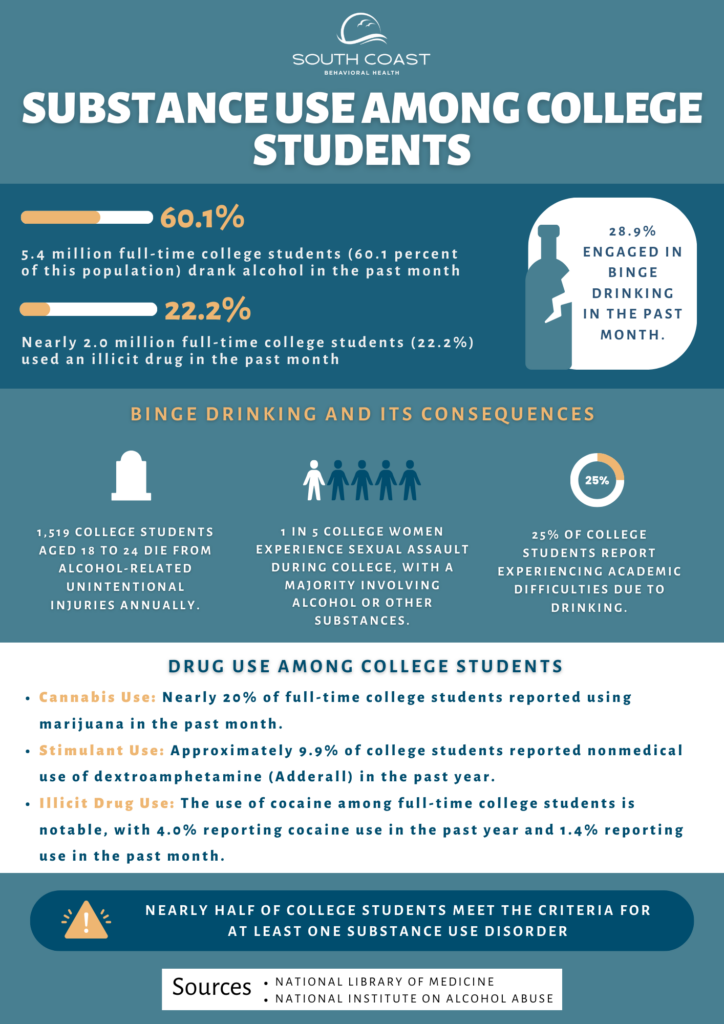Resources for College Students
Addiction is a difficult issue to cope with. Resources for college students can provide vital support for young adults struggling with drugs and alcohol. Learn more about South Coast’s college student resources and how they can assist in recovery from substance abuse.
Substance abuse and mental health resources for college students are valuable for young adults across the country. Post-high school education is a period of growth, learning, and new experiences. Many people look forward to college because they view it as finally heading out on your own. As such, there is a pervasive connection between university and trying new things. Indeed, college years are an excellent time to step outside of routine and learn more about oneself. However, many students also experiment with drugs and alcohol and become comfortable using substances. Similarly, many students struggle with their mental health. This is sometimes due to college factors, but substance use is known to exacerbate mental illness. Resources for college students ensure they have a place to turn for help. It’s important to know that help exists because it provides information and support when it is most critical.

College Students and Substance Abuse
University life has many cultural ideas surrounding it. For one, the years of post-high school education are for exploring career paths and making decisions about the future. Unfortunately, outside of this element, many young adults see college as a time for partying. The media heavily feeds into the connection between being young and uncontrolled in college and thus living wildly. Most movies and TV shows featuring university life normalize drug and alcohol use. Many older characters reflect on college as the best years of their life because of how they experimented. Realistically, there is a major downside to such ideas about substance abuse.
Drug and alcohol misuse in college can lead to poor physical health, failed classes, social strain, and increased risk of sexual assault. In the worst scenarios, it leads to overdose, a lifetime of struggling with addiction, or death. Binge drinking is a key concern amongst college students, as 39% report patterns of binging on alcohol. Statistically, those who binge drink are at a greater risk of also taking illicit drugs. More than 1 in 3 full-time students binge drink each month, and roughly 1 in 5 use illicit drugs. Commonly abused substances by college students are marijuana, cocaine, hallucinogenics, stimulants, and other prescription medications. In fact, it is estimated that over 20% of college students meet the criteria for having a substance dependence.
Unsurprisingly, abusing drugs and alcohol in one’s free time negatively affects their performance in school. Violence, sexual assault, low GPA, and an inability to find a job after graduation are linked to substance abuse in college. College student addiction statistics show the need for quality resources.
Effective Addiction and Mental Health Treatment Recovery Resources for College Students
Addiction and mental health treatment are vitally important for college students as they navigate through a pivotal period of personal and academic growth. The stresses of academic demands, social pressures, and newfound independence can exploit vulnerabilities to substance abuse and mental health disorders. Effective treatment not only addresses immediate symptoms but also equips students with coping strategies and resilience to thrive in their academic and social environments. Resources for college students provide guidance and support to those in need.
We are open 24 hours a day, 7 days a week, 365 days a year.
Addiction Resources for College Students
Students need to know that there is help available to them in the form of resources. Whether they’re trapped in the expectations of substance experimentation or feeling pressure and looking for release, help exists. At South Coast Behavioral Health, we know support greatly aids in the fight against addiction and substance abuse.
If you think you’re following unhealthy patterns with substances, these resources are for you. Along with these excellent sites, most universities offer their own resources. Many campuses provide substance abuse initiatives and prevention programs. They will be able to answer questions and recommend next steps. If you’re not sure what your college offers, you can explore the website or speak with your counselor.
Mental Health Resources for College Students
If you think you’re following unhealthy patterns with substances, these resources are for you. Along with these excellent sites, most universities offer their own resources. Many campuses provide substance abuse initiatives and prevention programs. They will be able to answer questions and recommend next steps. If you’re not sure what your college offers, you can explore the website or speak with your counselor.
If you’re struggling with symptoms of mental illness, whether new or diagnosed, know that there are many resources for you. College is a stressful time of new experiences that can impact anyone’s mental wellbeing. Reach out for support if you’re having trouble.
Where Else Can College Students Go for Help?
No matter what you’re struggling with or how difficult the situation seems, there is hope. This hope comes from help, because sometimes you have to step back and receive support. At South Coast, we are here for students, whether they’re battling mental illness, substance abuse, or both. Resources for college students are often the first step towards overcoming your challenges. However, sometimes you need more care than you can find on your own. Professional treatment centers are good options for those with addiction, mental illness, and co-occurring disorders.
We are here to answer any of your questions about treatment and recovery. Please reach out today and let us be a resource available to you!

Frequently Asked Questions About
Substance Abuse in College Students
What risk factors contribute to substance abuse in college students?
While many students enter college having some exposure to drugs and alcohol, the transition into college life can often increase the risk of substance abuse.
Common risk factors that contribute to addiction include:
- Family history of substance abuse
- Untreated mental health conditions
- Unresolved trauma
There are also several risk factors for substance use and abuse that are more prevalent in college settings such as:
- Affiliation with Greek life
- Academic stress
- Peer pressure
- Lack of parental oversight
- Indulgence in curiosity and experimentation
- Self-medicating mental health issues
When do students face the greatest risks associated with alcohol?
The greatest risks associated with drinking alcohol typically occur within the first six weeks of freshman year. During this time, students are particularly susceptible to engaging in dangerous underage drinking. This level of vulnerability is largely due to heightened social pressures and expectations to fit in and succeed in the new learning environment. As a result, college freshmen are at an increased risk of experiencing the adverse consequences associated with alcohol.
What is binge drinking in college?
Binge drinking is defined as consuming 5+ drinks at once for men and 4+ drinks for women. According to the 2022 National Survey on Drug Use and Health (NSDUH), 49% of full-time college students ages 18–22 drank alcohol and 29% engaged in binge drinking in the past month.
What is high-intensity drinking in college?
While researchers have yet to define an exact number of drinks a person would have to consume to qualify as high-intensity drinking, the general consensus is that this pattern is at least twice the typical threshold of binge drinking. This means that high-intensity drinking consists of 10+ drinks at once for men and 8+ drinks for women.
Research shows that young adults who attend a 4-year college full time are more likely to report engaging in a high-intensity drinking and binge drinking than drinkers who do not attend college, attend a 2-year college, or attend college part time.
When do college students drink the most?
Research shows that individuals often increase their alcohol consumption to celebrate, strengthen friendships. Examples in which college students are most likely to engage in binge and high-intensity drinking include:
- Holidays
- Sporting events
- 21st birthdays
- Spring break
- Post-exams
- Festivals
- Parties
- Other special occasions
Studies on the fluctuations in college-aged drinking patterns report that the maximum drinks consumed increases 18% over the course of Spring term and 31% upon returning to school in the fall. In contrast, the number of drinks per occasion decreased 29% in the summer.
How common is over-drinking in college?
According to a Gallup poll, young adults in the US report drinking less than in previous decades. The average number of drinks young adults report having in the past week fell from 5.2 in 2001–2003 to 3.6 in 2021–2023.
What are the consequences of underage drinking and drug use in college?
Death
Over 1,500 college students ages 18-24 die from alcohol-related injuries, including motor vehicle crashes. (NIAAA)
Assault
Around 696,000 students ages 18-24 are assaulted by another intoxicated student. (NIAAA)
Sexual Assault
1 in 5 college women and 1 in 16 men fall victim to sexual assault during their college years. (NSVRC)
Studies found that 15% of female freshmen were sexually assaulted after becoming incapacitated. By their second year in college, 26% of women experienced incapacitated rape. Self-reported rates of rape among men are far less common, limiting the scope of alcohol’s impact on male victims of sexual assault.
Academic Problems
About 1 in 4 college students report experiencing academic difficulties from drinking. Academic problems include missing class, getting behind in schoolwork, and performing poorly on a test or assignment. (College Drinking Prevention)
Future Unemployment
Research suggests that persistent drug use among academically achieving young adults may increase the risk for unemployment following graduation. After six years, around 13% of people working full-time jobs and 24% working part-time jobs met DSM-IV criteria for drug abuse or dependence during the past year.
Substance Use Disorder (SUD)
A 2019 study found that nearly half of participating college students met the DSM criteria for at least one substance use disorder (SUD).
Alcohol Use Disorder (AUD)
Roughly 14% of college students meet the criteria for alcohol use disorder (AUD). (NIAAA)

College Student Resources at South Coast
Some treatment centers offer specialized treatment programs for college students. At South Coast Behavioral Health, we can help young adults with their addiction and mental health problems. Our treatment programs focus on evidence-based and holistic care because we know healing can’t happen if there are unaddressed issues.
When faced with the stress, anxiety, and social pressures of college life, turning to drugs and alcohol isn’t the answer. We can help college students manage their mental health and move on to a brighter future.
- Managing stress
- Reducing anxiety
- Improved relationships with family and friends
- Better academic performance
- A building a strong foundation for the future
We would love to answer your questions about addiction recovery for college students. Please reach out today and let us help you move forward.
Get A Confidential Assessment From A Recovery Specialist
Our Addiction Treatment Centers in California
Our network of California treatment centers can help college students overcome their mental health and addiction issues safely and effectively. Our process involves the latest and greatest evidence-based and holistic practices for a well-rounded approach to recovery. We offer gender-specific programs for an even more personalized approach to healing.
Irvine, CA
We provide treatment for drug and alcohol use disorders within our medical detox and residential treatment centers in Irvine, CA.
Huntington Beach, CA
We provide addiction treatment services for women within our medical detox and residential treatment centers in Huntington Beach, CA.
We provide addiction treatment for men within our residential inpatient facility in Costa Mesa, CA.
We provide care for men and women in recovery from substance abuse within our PHP and IOP treatment facility in Newport Beach, CA.
Our caring staff of recovery professionals is available 24/7 to assist in the recovery process. Call us today at 866-881-1184 for more information about how we can help college students with recovery.
Alcohol and Young Adults Ages 18 to 25 – NIAAA
Substance Use Among College Students – PMC
Drug use patterns in young adulthood and post-college employment – PMC
Consequences | College Drinking Prevention
Incapacitated and forcible rape of college women: prevalence across the first year – PMC
Statistics about sexual violence – NSVRC
Fall Semester—A Time for Parents To Discuss the Risks of College Drinking – NIAAA
Young Adults in U.S. Drinking Less Than in Prior Decades – Gallup Poll
Drinking Patterns Across Spring, Summer, and Fall in 462 University Students – PMC
Overview of Alcohol Consumption – NIAAA
High-intensity drinking by underage young adults in the United States – PMC
High-Intensity Drinking | Alcohol Research: Current Reviews – NIAAA
National Survey on Drug Use and Health 2022 (NSDUH-2022-DS0001) | SAMHDA


